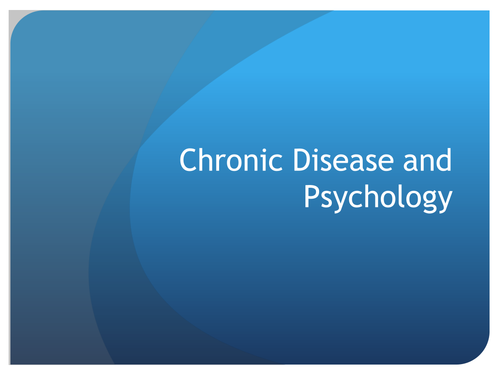
134Uploads
50k+Views
12k+Downloads
Psychology

Health Promotion
This is about 4 hours worth of teacher-led tutorial and student activities on health promotion.
Students will cover the following:
Healthy/unhealthy/risk taking behaviours
Why health promotion is used
Organisations on a local and national level which seek to promote health
Health Targets
Models of Behaviour Change
Health Promotion Activities and Techniques
Students will build on their research and evaluation skills.

Chronic Disease and Psychology
A Full lesson with student activities surrounding psychology and how its theories can be used to explain/support Chronic Disease.
The lesson covers Pain Management/Gate Control Theory, Coping Strategies, Pain Perception, Wound Healing, Behaviour Change Models and Biofeedback.
It was originally written for Access to HE Health and Social Sciences (Level 3) students but can be tailored to fit other courses.

Medicalisation
Whole lesson with activities covering medicalisation in terms of the 'Third Sex', 'Homosexuality' and 'Dying'.
Covers points such as cross-cultural perspectives and social control.
Originally produced for Access to Higher Education but could be adapted to meet some Sociology specifications for other courses.

Explanations of Mental Illness Starter
Students will need some prior knowledge of the biological, psychological and social explanations of mental illness to partake in this Starter activity: Presentation concerns images which relate to either the biological, social or psychological explanations of mental illness. Students will need to work independently to note down which slides they think correspond to which approach. There is some overlap which will generate discussion! I would recommend that you have an impromptu discussion at the end of the starter to enable students to justify their answers, this should be an ideal AfL opportunity.

Mental Health Inequalities and Discrimination
Two full days worth of lessons which could be delivered across several weeks to suit a range of timetables. Originally designed for Level 3 students, this is a detailed presentations containing thought provoking activities for students. It could be tailored to fit several subject areas and student abilities.
No teacher preparation needed but students would benefit from A3 poster for one of the activities.
Content is as follows: considering the impact that an unequal society may have on mental health statuses via a group research task. This will include topics such as geographical factors, unemployment and socio-economic status.
Impact of mental health discrimination and the laws/policies surrounding this-student poster activity.
The second section of the powerpoint looks at social norms, the link between misconceptions of individuals with mental health conditions being criminals-leading to looking at the deviancy amplification theory.
Scenarios and thought-provoking questions throughout which can be tailored dependent on student ability.

What is classified as Normal and Abnormal behaviour?
This worksheet is best bought as part of a bundle with the accompanying PowerPoint. Students will indicate a list of behaviours and whether they deem them as normal or abnormal. They will then justify their responses. Can be used a starter or a plenary.
Bundle

Psychology/Mental Health
A range of full lessons on psychology and mental health. Applicable to A-Level, Health and Social Courses, Psychology Courses and Access to HE Courses.

Labelling Theory and Crime
This lesson introduces students to the idea of labelling theory and what can impact on being labelled as criminal e.g. the circumstance, historical period etc. Modern examples are used e.g. the one legged model to introduce students to this area in a way they can relate to.
Students will embark on a range of activities surrounding Becker, Labelling theory, Producing a Web Page based on the theory and will be briefly introduced to the overlap between sociological/criminological theory and philosophy by looking at John Stuart Mills and Jeremy Bentham.
This should last for around 2 hours depending on the group delivered to.









